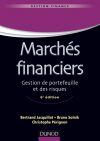Biography
Biography
Christophe Pérignon is Professor of Finance, Deloitte Chair in AI for Business Innovation, and Associate Dean for Research at HEC Paris, France. He is also scientific co-director of Hi!PARIS, the center on Artificial Intelligence for Science, Business and Society created by Institut Polytechnique de Paris and HEC Paris. Christophe obtained a Ph.D. in Finance from the Swiss Finance Institute and was a Post-Doctoral Fellow at the University of California at Los Angeles (UCLA). Prior to joining HEC Paris, he was an Assistant Professor of Finance at Simon Fraser University in Vancouver, Canada. His research and teaching focus on the applications and implications of artificial intelligence and machine learning in finance. Christophe published a dozen of articles in top finance journals (Journal of Finance, Journal of Financial Economics, Review of Financial Studies, Journal of Business, Journal of Financial and Quantitative Analysis, and Review of Finance), as well as several articles in top management (Management Science) or general-science journals (Science). In 2014, he received the Europlace Award for the Best Young Researcher in Finance. With Christophe Hurlin, he co-founded cascad, a certification agency verifying the reproducibility of the results displayed in scientific articles. Christophe is also the founder of RAMP-UP, a 'science-job' matching platform for students and professors.


Publications
Publications
Measuring the Driving Forces of Predictive Performance: Application to Credit Scoring NEW
Management Science, forthcoming (with Hué, S. C. Hurlin and S. Saurin)
The Fairness of Credit Scoring Models NEW
Management Science, 2026 (with C. Hurlin and S. Saurin)
Intelligence Artificielle et Marché du Crédit: Opportunités et Acceptabilité NEW
Revue d’Economie Financière, 2025 (with C. Hurlin) [WP version in English]
Computational Reproducibility in Finance: Evidence from 1,000 Tests
Review of Financial Studies, 2024 (with O. Akmansoy, C. Hurlin, A. Menkveld, A. Dreber, F. Holzmeister, J. Huber, M. Johannesson, M. Kirchler, M. Razen, U. Weitzel)
The Role of Third-Party Verification in Research Reproducibility
Harvard Data Science Review, 2024 [journal link]
Non-Standard Errors
Journal of Finance, 2024 (with A. Menkveld, A. Dreber, F. Holzmeister, J. Huber, M. Johannesson, M. Kirchler, M. Razen, U. Weitzel et al.)
My role: I designed and implemented the reproducibility verification policy of the #fincap project.
Reproducibility in Management Science
Management Science, 2024 (with M. Fišar, B. Greiner, C. Huber, E. Katok, A.I. Ozkes, and the Management Science Reproducibility Collaboration)
My role: I am a member of the Management Science Reproducibility Collaboration.
What if Dividends Were Tax-Exempt? Evidence from a Natural Experiment
Review of Financial Studies, 2021 (with D. Isakov and J.P. Weisskopf)
The Private Production of Safe assets
Journal of Finance, 2021 (with M. Kacperczyk and G. Vuillemey)
Certify Reproducibility with Confidential Data
Science, 2019 (with K. Gadouche, C. Hurlin, R. Silberman, and E. Debonnel)
Machine learning et nouvelles sources de données pour le scoring de crédit
Revue d'Economie Financière, 2019 (with C. Hurlin)
The Counterparty Risk Exposure of ETF Investors
Journal of Banking and Finance, 2019 (with C. Hurlin, G. Iseli, and S. Yeung)
Pitfalls in Systemic-Risk Scoring
Journal of Financial Intermediation, 2019 (with S. Benoit and C. Hurlin)
Wholesale Funding Dry-Ups
Journal of Finance, 2018 (with D. Thesmar and G. Vuillemey)
The Political Economy of Financial Innovation: Evidence from Local Governments
Review of Financial Studies, 2017 (with B. Vallée)
CoMargin
Journal of Financial and Quantitative Analysis, 2017 (with J. Cruz Lopez, J. Harris, and C. Hurlin)
Where the Risks Lie: A Survey on Systemic Risk
Review of Finance, 2017 (with S. Benoit, J.E. Colliard, and C. Hurlin)
Implied Risk Exposures
Review of Finance, 2015 (with S. Benoit and C. Hurlin)
The Risk Map: A New Tool for Validating Risk Models
Journal of Banking and Finance, 2013 (with G. Colletaz and C. Hurlin)
Derivatives Clearing, Default Risk, and Insurance
Journal of Risk and Insurance, 2013 (with R. Jones)
The Pernicious Effects of Contaminated Data in Risk Management
Journal of Banking and Finance, 2011 (with L. Frésard and A. Wilhelmsson)
The Level and Quality of Value-at-Risk Disclosure by Commercial Banks
Journal of Banking and Finance, 2010 (with D. Smith)
Diversification and Value-at-Risk
Journal of Banking and Finance, 2010 (with D. Smith)
Commonality in Liquidity: A Global Perspective
Journal of Financial and Quantitative Analysis, 2009 (with P. Brockman and D. Chung)
How Common are Common Return Factors across Nyse and Nasdaq
Journal of Financial Economics, 2008 (with A. Goyal and C. Villa)
A New Approach to Comparing VaR Estimation Methods
Journal of Derivatives, 2008 (with D. Smith)
Do Banks Overstate their Value-at-Risk?
Journal of Banking and Finance, 2008 (with Z. Deng and Z. Wang)
Repurchasing Shares on a Second Trading Line
Review of Finance, 2007 (with D. Chung and D. Isakov)
Testing the Monotonicity Property of Option Prices
Journal of Derivatives, 2006
Sources of Time Variation in the Covariance Matrix of Interest Rates
Journal of Business, 2006 (with C. Villa)
Working Papers
Working Papers
The Challenger: When Do New Data Sources Justify Switching Machine Learning Models (with V. Digalakis Jr, S. Saurin, F. Sentenac) December 2025
We study the problem of deciding whether, and when an organization should replace a trained incumbent model with a challenger relying on newly available features. We develop a unified economic and statistical framework that links learning-curve dynamics, data-acquisition and retraining costs, and discounting of future gains. First, we characterize the optimal switching time in stylized settings and derive closed-form expressions that quantify how horizon length, learning-curve curvature, and cost differentials shape the optimal decision. Second, we propose three practical algorithms: a one-shot baseline, a greedy sequential method, and a look-ahead sequential method. Using a real-world credit-scoring dataset with gradually arriving alternative data, we show that (i) optimal switching times vary systematically with cost parameters and learning-curve behavior, and (ii) the look-ahead sequential method outperforms other methods and is able to approach in value an oracle with full foresight. Finally, we establish finite-sample guarantees, including conditions under which the sequential look-ahead method achieve sublinear regret relative to that oracle. Our results provide an operational blueprint for economically sound model transitions as new data sources become available.
Global p-Values in Multi-Design Studies (with G. Coqueret, Y. Zhang, F. Chiaromonte, S. Guerrier) July 2025
Replicability issues -- referring to the difficulty or failure of independent researchers to corroborate the results of published studies -- have hindered the meaningful progression of science and eroded public trust in scientific findings. In response to the replicability crisis, one approach is the use of multi-design studies, which incorporate multiple analysis strategies to address a single research question. However, there remains a lack of methods for effectively combining outcomes in multi-design studies. In this paper, we propose a unified framework based on the g-value, for global p-value, which enables meaningful aggregation of outcomes from all the considered analysis strategies in multi-design studies. Our framework mitigates the risk of selective reporting while rigorously controlling type I error rates. At the same time, it maintains statistical power and reduces the likelihood of overlooking true positive effects. Importantly, our method is flexible and broadly applicable across various scientific domains and outcome results.
Persistent Anomalies and Nonstandard Sharpe Ratios (with G. Coqueret) February 2026
We propose a framework for rigorous inference in the evaluation of asset pricing anomalies that explicitly accounts for multiple methodological choices. We demonstrate that running multiple paths on the same dataset results in high correlation across outcomes, distorting inference. Alternatively, path-specific resampling reduces outcome correlations and tightens the confidence interval of the average return. Accounting for across- and within-path variability allows us to decompose the variance of the average return into a standard error, a nonstandard error, and a correlation term. We define the nonstandard Sharpe ratio as the ratio of the average return to the nonstandard error and show that this metric enables the identification of persistent anomalies. Empirically, we show that nonstandard errors dominate standard errors, and that 24% of the anomalies in our sample (26 out of 107) are fully persistent.
Machine Learning and IRB Capital Requirements: Advantages, Risks, and Recommendations (with C. Hurlin)
This survey proposes a theoretical and practical reflection on the use of machine learning methods in the context of the Internal Ratings Based (IRB) approach to banks' capital requirements. While machine learning is still rarely used in the regulatory domain (IRB, IFRS 9, stress tests), recent discussions initiated by the European Banking Authority suggest that this may change in the near future. While technically complex, this subject is crucial given growing concerns about the potential financial instability caused by the banks' use of opaque internal models. Conversely, for their proponents, machine learning models offer the prospect of better measurement of credit risk and enhancing financial inclusion. This survey yields several conclusions and recommendations regarding (i) the accuracy of risk parameter estimations, (ii) the level of regulatory capital, (iii) the trade-off between performance and interpretability, (iv) international banking competition, and (v) the governance and operational risks of machine learning models.
The Economics of Computational Reproducibility (with J.-E. Colliard and C. Hurlin)
We investigate why economics displays a relatively low level of computational reproducibility. We first study the benefits and costs of reproducibility for readers, authors, and academic journals. Second, we show that the equilibrium level of reproducibility may be suboptimally low due to three market failures: a competitive bottleneck effect due to the competition between journals to attract authors, the public good dimension of reproducibility, and the positive externalities of reproducibility outside academia. Third, we discuss different policies to address these market failures and move out of a low reproducibility equilibrium. In particular, we show that coordination among journals could reduce by half the cost of verifying the reproducibility of accepted papers.
Reports
Reports
Reproducibility of scientific results in the EU. Publication Office of the EU. December 2020.
Authors: Baker, Lee; Lusoli, Wainer; Jaśko, Katarzyna; Parry, Vivienne; Pérignon, Christophe; Errington, Timothy; Cristea, Ioana Alina; Winchester, Catherine; MacCallum, Catriona; Šimko, Tibor
Work in Progress
Work in Progress
Fairness equivalence in credit scoring: A framework to treat algorithms like prescription drugs
Biases in AI-enhanced human decisions: Evidence from hiring
When should the challenger model replace the champion model? Theory and evidence
Beyond accuracy: A multi-dimensional assessment of high-stakes AI applications
Book
Books

Marchés Financiers: Gestion de Portefeuille et des Risques
6e Edition, Dunod
Bertrand Jacquillat, Bruno Solnik & Christophe Pérignon
Order Here



